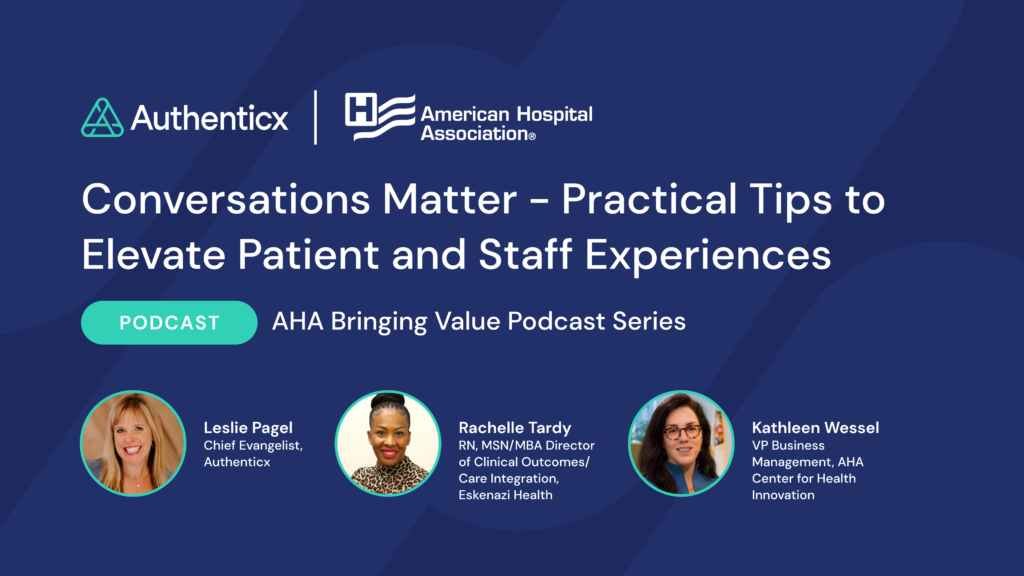Listen at scale for effective communication with patients.
Aggregate topics, themes, and patterns from millions of conversations to drive relevant insights that enhance business outcomes and customer support.
Learn More
Improve your call metrics and their quality of care by blending regulations with human connection. Get answers about your script strategy.
Enhancing the Patient Experience Through Employee Conversations
First-hand experiences from clients give value to your strategic initiatives. Join Authenticx Chief Evangelist Leslie Pagel and Eskenazi Health on the ‘AHA Associates Bringing Value Podcast’.
Join the Discussion
Effective Communication With Patients
Effective communication with patients is a cornerstone of high-quality healthcare delivery. In any healthcare setting, understanding how doctors should communicate with patients is crucial for building trust, ensuring patient safety, and achieving positive health outcomes. However, effective communication goes beyond simply exchanging information — it involves establishing a meaningful connection with patients and actively involving them in their own care.
Successful communication with patients requires healthcare providers to employ a wide variety of skills and strategies. Healthcare providers must be able to convey information clearly, using language that’s free from medical jargon and easy for patients to understand. They should actively listen to patients, encouraging them to express their concerns, fears, and preferences. Non-verbal cues, such as body language and facial expressions, are also important in conveying empathy and creating a supportive environment.
Effective communication extends to communicating effectively with team members as well. Collaboration is essential in healthcare, and healthcare professionals must be able to exchange information and coordinate care seamlessly. Effective communication between healthcare professionals promotes better patient outcomes, reduces errors, and enhances the overall patient experience.
The significance of effective communication in healthcare is well-documented. Studies have shown that patients who perceive their healthcare providers as good communicators are more likely to be satisfied with their care and adhere to treatment plans. When patients are engaged in their care and have a clear understanding of their condition, they are usually better equipped to make informed decisions about their health.
Conversely, the effects of poor communication in healthcare can be detrimental. Misunderstandings or breakdowns in communication can lead to errors or delays in treatment. Poor communication can also contribute to patient dissatisfaction and increased healthcare costs.
Many healthcare organizations are increasingly prioritizing communication training to foster a culture of open and effective communication. This type of training may include communication skills workshops, communication assessments, and interdisciplinary collaboration.
Effective communication with patients and among healthcare professionals is crucial for providing high-quality healthcare. Good communication in the healthcare industry involves strategies like clear and empathetic information exchange, active listening, and patient involvement in care. By improving communication, healthcare providers can enhance patient satisfaction and improve outcomes overall.
On the other hand, poor communication can lead to negative consequences for both patients and healthcare providers. By prioritizing effective communication and fostering a culture of open dialogue among providers, patients, and team members, healthcare organizations can promote patient-centered care and encourage positive health outcomes.
How To Communicate With Patients Effectively
Effective communication with patients is a vital skill for healthcare providers. Good communication is one of the keys to ensuring optimal patient care and satisfaction. Here are ten communication tips for talking to patients that can help healthcare professionals enhance their communication skills:
- Establish rapport: Build a connection with the patient by introducing yourself, maintaining eye contact, and demonstrating empathy and respect.
- Active listening: Give patients your full attention and actively listen to their concerns and needs. Show understanding and validate their experiences.
- Use clear and simple language: Avoid medical jargon and use plain language to explain medical conditions and treatment plans. Check for understanding throughout the conversation and encourage questions.
- Empower patients: Involve patients in their own care decisions. Provide them with all the relevant information, discuss the options available to them, and ultimately respect their choices.
- Non-verbal cues: Be aware of your body language, facial expressions, and tone of voice. Your non-verbal cues should convey empathy and openness.
- Be patient-centered: Tailor your communication style to meet the individual needs and preferences of each patient. Respect cultural differences and consider any language barriers that may exist.
- Time management: Allocate sufficient time for each patient encounter. Rushing through appointments can hinder effective communication and make patients feel unheard.
- Use visual aids: Utilize visual aids such as diagrams or charts to enhance patient understanding of complex medical concepts.
- Address emotions: Acknowledge and address the emotional aspects of each patient’s care. Show compassion and provide appropriate support during difficult moments.
- Follow-up and continuity of care: Maintain communication with patients beyond the initial encounter. Promptly address any concerns or questions and provide ongoing support by following up on their treatment progress.
It is also essential to recognize the importance of communicating with patients’ families. However, it can sometimes be challenging for healthcare providers to know what to say to patients’ families. Here are a few important tips for healthcare providers to remember when communicating with patients’ families:
- Be transparent and honest about the patient’s condition and treatment options.
- Be sensitive to the emotional impact of your words on family members and offer appropriate empathy.
- Provide clear instructions and educate family members about their role in the patient’s care.
- Keep family members updated on the patient’s progress and involve them in decision-making when appropriate.
- Always respect families’ privacy and confidentiality while also addressing any questions or concerns they may have.
Tips like these can help healthcare providers better understand how to talk to patients’ families. By following these best practices and tailoring communication to each patient’s specific needs, healthcare providers can foster effective and compassionate communication and improve patient satisfaction.
Importance Of Effective Communication In Healthcare Setting
Effective communication in healthcare settings plays a pivotal role in ensuring optimal patient outcomes. It is difficult to overstate the impact of communication in healthcare, as communication heavily influences many aspects of the care journey, including:
- The overall patient experience
- Accurate diagnosis and treatment
- Shared decision-making between patients and providers
- Collaboration among healthcare professionals
First and foremost, the importance of communication with patients is demonstrated in the way it builds trust. When healthcare providers communicate effectively with patients, it creates an environment of trust and understanding. Patients who feel heard, respected, and valued are more likely to be satisfied with their care. Effective communication also enables patients to actively participate in shared decision-making, empowering them to make informed choices about their treatment options.
Effective communication is also essential for coordination and collaboration among healthcare professionals. Clear communication ensures that vital patient information is accurately transmitted, reducing the risk of medical errors and other consequences. When patients have a clear understanding of their medical situation, they are able to actively participate in their own care and make informed decisions. By providing accurate and comprehensive information, healthcare providers empower patients to take ownership of their healthcare experiences.
The Importance of Giving Information to Patients
Effective communication in healthcare settings has numerous benefits, including:
- Positively impacts patient satisfaction
- Facilitates shared decision-making
- Enhances patient safety
- Establishes trust
- Empowers patients and promotes patient engagement
- Improves overall healthcare outcomes
Effective communication within healthcare teams ensures that information is exchanged accurately, leading to better coordination and collaboration. Giving accurate information to patients enables them to make informed decisions and actively participate in their healthcare journeys. By recognizing the importance of effective communication and continuously improving communication skills, healthcare providers can deliver patient-centered care that improves outcomes and fosters a culture of collaboration within healthcare settings.
How It Works
Gain a deeper level understanding of contact center conversations with AI solutions.
See a PreviewAggregate
Pull customer interaction data across vendors, products, and services into a single source of truth.
Analyze
Collect quantitative and qualitative information to understand patterns and uncover opportunities.

Activate
Confidently take action with insights that close the gap between your organization and your customers.
What Is Effective Communication In Healthcare
There are various elements that contribute to clear and meaningful interactions between healthcare providers and patients.
Why Is Health Information Important?
First of all, it is vital for patients to receive accurate and relevant health information in order to make informed decisions about their care. Effective communication includes providing patients with clear explanations and addressing their questions and concerns. Resources like patient information leaflets can also play a role in conveying health information in a concise and accessible format.
In addition to sharing health information with patients, effective communication in healthcare involves practicing active listening. Healthcare providers should attentively listen to patients, giving them the space to express their symptoms and concerns. By actively listening, healthcare professionals can gain a comprehensive understanding of the patient’s situation and provide personalized care.
Providers should always communicate with patients in a compassionate and respectful manner. They should strive to create an environment that encourages open dialogue so that patients feel comfortable asking questions and expressing their concerns. Effective communication also involves involving patients in their own care by openly discussing treatment options and incorporating the patient’s preferences into the decision-making process.
Importance of Knowing Your Patient
Knowing your patient is essential for effective communication. Understanding the patient’s background, beliefs, culture, and personal preferences can help healthcare providers tailor their communication style and adapt to individual needs. In general, building a trusting and supportive relationship is crucial for effective communication in healthcare.
Examples Of Effective Communication In Healthcare
There are many types of communication in healthcare. Here are some good examples of communication in healthcare settings:
- A nurse could practice empathy and active listening by sitting with a patient who is feeling anxious and listening attentively to their concerns. This type of active listening can help to alleviate the patient’s anxiety and build trust between the patient and the healthcare provider.
- A doctor could engage in collaborative decision-making with a patient by discussing different treatment options, explaining the pros and cons of each, and considering the patient’s preferences and values.
- A healthcare team could hold regular internal meetings to discuss patient cases and coordinate care plans. This would enable them to effectively communicate updates and share resources to ensure a comprehensive and cohesive approach to patient care.
On the other hand, there are also examples of communication errors in healthcare that further highlight the importance of effective communication. By sharing stories of miscommunication in healthcare and elevating the importance of effective communication, healthcare professionals can learn from past mistakes and strive for better communication practices to improve patient safety and outcomes.